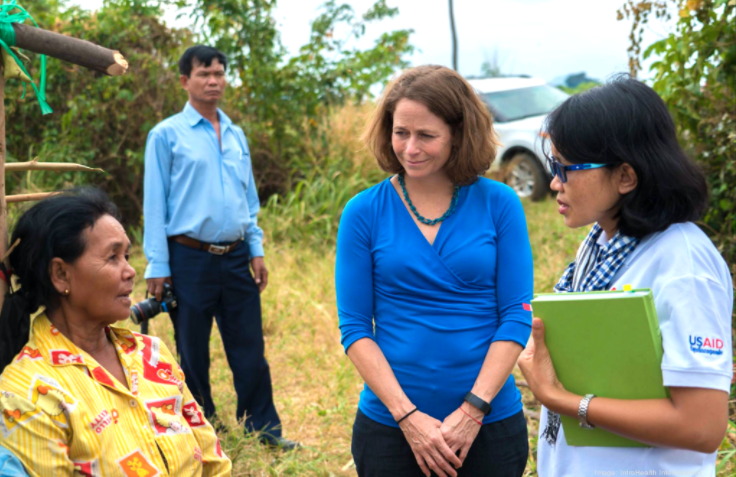Where We Work
See our interactive map


Polly Dunford, second from right, took the lead at IntraHealth International as Covid-19 arrived.
She brings a global view on health care to Chapel Hill.
In March, Polly Dunford was named president and CEO of IntraHealth International, a large global health organization based in Chapel Hill. There was also another development beginning to gain some traction, especially in the US: the novel coronavirus. But it’s not the first time Dunford has been in a similar situation. She worked for the U.S. Agency for International Development, where she served for almost 20 years, at the earlier stages of another epidemic: HIV. “That’s when I saw the challenges health workers often face on the front lines,” she says. “That was before we had access to antiretroviral drugs. Palliative care was the best we could offer in those very early days.”
By the time Dunford left USAID for IntraHealth, she was the global director for HIV/AIDS. IntraHealth is a 40-year-old nonprofit that employs about 750 staff members in 33 countries.
Our mission is all about health workers, because without them, health care doesn’t happen. Our goal is to improve the performance of health workers and strengthen the systems in which they work so that everyone, everywhere, has the health care they need to thrive.
Of course, the pandemic has brought health workers into the public spotlight like never before. They’re facing incredible dangers on the front lines of this disease. But a lot of the issues they’re facing right now because of COVID-19 are not new—we’ve known for years that we’re facing a massive global shortage of health workers, and that the ones we do have are often overworked, under-resourced, and not equitably spread out to the places they’re most needed. These are all issues IntraHealth works to address.
I started off as a Peace Corps volunteer in Côte d’Ivoire (Ivory Coast). Then I served as the country director of the Near East Foundation in Morocco. I’ve spent most of my career living overseas, including in Cambodia, Haiti, Jordan, Morocco, Mozambique, and Nigeria.
I joined IntraHealth because it’s an amazing organization with a crucial mission. We’re looking to the future and taking on global health’s next-generation challenges. It’s a very exciting time to be in this space, not only because our field is changing, but because the stakes have never been higher.
Adapting our programs to help countries respond to COVID-19 while also keeping our staff safe.
We have to make sure health workers have what they need not only to manage coronavirus, but also to keep everyday essential services up and running. Their communities still need them for delivering babies, providing family planning and HIV services, treating cancer—all the urgent needs that don’t stop during a pandemic. We started the COVID-19 Frontline Health Worker Fund for this very reason—to provide health workers with the equipment, training, and support they urgently need now, not later.
I joined IntraHealth in March, right as the pandemic closed down our offices and sent us all to work from home. By now, if these were normal times, I would have visited most of our offices around the world, shaken hands with every one of our country leaders, and visited health facilities with them. But like everyone else right now, we’re doing everything remotely.
One of my priorities since joining IntraHealth has been to make sure our staff are safe and getting the support they need—whether it’s equipment they need for their home office or flexible hours so they can help their kids with remote learning.
And our programs have changed how they operate, too. Thanks to our incredibly strong country leaders, our programs have pivoted on a dime, adapting many of our existing systems and digital health technologies to forecast COVID-19 outbreaks and connect clients to care even when public transport is down or clinics are closed because of the pandemic. In each country, we’re adapting to local needs and ever-shifting local restrictions to get the job done.
But COVID-19 isn’t the only thing this year that’s changed how we work. The murders of George Floyd, Breonna Taylor, Ahmaud Arbery, and other Black Americans—on top of generations of systemic oppression and trauma in the US—spurred us to take a good, hard look at ourselves, and to act. We still have work to do in this area, but we’re making progress. I’m incredibly proud of our staff’s dedication to becoming a more antiracist organization and the work we’re doing to face the legacy of racism in public health and to contribute to decolonizing global health.
Right now, all of us at IntraHealth are working from home until it’s safe to return to the office. But I hope to move to Chapel Hill within the next couple of years. Until then, because of family considerations, I’ll be commuting frequently.
Short-term, my goal is to keep our staff safe during this pandemic. Long-term, we’re developing a strategy to partner with countries and communities to build the health workforce of the future.
I’m incredibly proud of the role I played in scaling up antiretroviral therapy for people living with HIV over my 15 years with PEPFAR (President’s Emergency Plan for AIDS Relief).
“The best solution to any problem comes in partnership with the people within a community.” A health worker named Michele Moloney-Kitts, who is now part of IntraHealth’s board of directors, told me this early in my career. I’ve always remembered it, and it’s always been true.
Be outdoors. I like to run, ski, hike, and swim, depending on the season.
“Caste: The Origins of our Discontents,” by Isabel Wilkerson; “Leadership: In Turbulent Times,” by Doris Kearns Goodwin; “When Breath Becomes Air,” by Paul Kalanithi.
This article originally appeared in the Triangle Business Journal on December 3, 2020. You can read it here.
Get the latest updates from the blog and eNews




